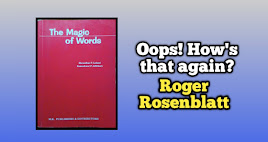Oops! How's that again? By Roger Rosenblatt Summary
Oops how's that again essay summary by roger rosenblatt
3 min read
Oops! How's that again? - Roger Rosenblatt
The writer Roger Rosenblatt in the essay Oops! how's that again has given numerous examples of slips of tongue committed by renounced personalities. The writer in the essay has analyzed these slips of tongue with the help of linguistics and psychoanalyst. The writer in the essay has also highlighted about different kinds of laughter associated with the slip of tongue. Interestingly, by the end of the essay the writer urges his readers not to laugh at slip of tongue because they are part and partial of our life and we cannot escape them.
The writer begins the essay with the humorous example of English businessman Peter Balfour who mistakenly said lady Jane instead of Lady Diana, while wishing conjugal happiness to the royal couple i.e. lady Diana and prince. Equally funny is the example of French prime minster Raymond Barre, whose statement implied that Jews were neither French nor they were innocent. Similarly, the first lady Nancy Reagan made the mistake of saying that she is delighted to be looking at all the beautiful white Americans. The writer is of the opinion that mistranslation also results in a slip of tongue. American president Jimmy carter was a victim of mistranslation when his speech was wrongly translated to mean something else, while Pepsi's slogan "come alive with Pepsi" also suffered due to mistranslation.
The writer proceeds on to analyze these slips of tongue with the help of Linguists and psychoanalyst. Linguists are of the opinion that slips of tongue help us to know how our brave stores the language in a grammatical framework before it is expressed. Linguists maintain that if our brain is affected by some factors, the grammatical framework will also be disturb, which will result in the slip of tongue. Psychoanalyst on the other hand argue that there is no mistake in language since we are speaking our mind.
Psychoanalyst Sigmund Freud gives the example of a young boy who took his girlfriend to a restaurant and ordered for a room instead of table. To highlight the fact that he mistakenly said room because room was in his mind. The other psychoanalyst Ludwig Eidelberg highlighted about different levels in our mind namely Id, ego and superego, which resulted in a slip of tongue and that this verbal error is not the mistake but only natural because of the confusion resulted by different levels of our mind. Likewise another psychoanalyst Richard Yazmajian talked about associative chain to find a reason for the occurrence of a slip of tongue.
The writer in the essay has also highlighted about the different kinds of laughter associated with a slip of a tongue. People laugh by listening to the mistake, they laugh by looking at the face of the blunderer, they laugh by realizing the hidden truth and they laugh again by sympathizing with the blunderer. The writer is of opinion that these slips of tongue are very appropriate to our life because although accidently they reveal the truth.
Towards the concluding parts of the essay, the writer advises his readers not to laugh at a slip of tongue because they are very common and wide spread. The wrier is of the opinion that there is a slip in every step of our life as our plans do not materialize, it rains on a picnic day, the new year day is just another ordinary day, nothing happens on your birthday the much awaited party falls flat, our life is not white we expected it to be and so on. The writer finally concludes his essay saying that the next time you hear a slip of tongue, please don't laugh at it because our life itself is a slip of tongue, death being the biggest slip of our life.



Post a Comment